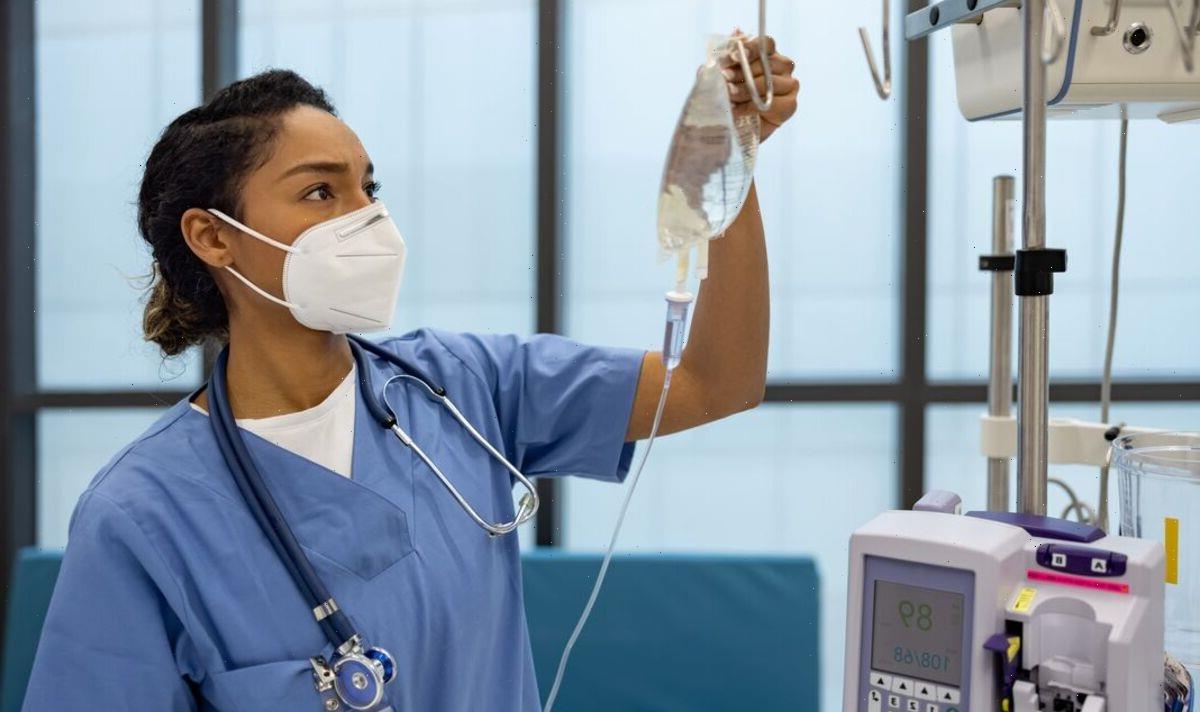PMQs: Sunak challenges Starmer on ‘out of date’ NHS plans
We use your sign-up to provide content in ways you’ve consented to and to improve our understanding of you. This may include adverts from us and 3rd parties based on our understanding. You can unsubscribe at any time. More info
NHS patients could lose out on access to groundbreaking new drug treatments after two major pharmaceutical companies ditched a scheme that limits the amount of money spent on new medicines for the health service. Under the Voluntary Scheme for Branded Medicines Pricing and Access, (VPAS), an agreement exists between the Government, NHS and medicine manufacturers to keep a limit on the cost of medicines for the health service without scuppering innovation.
As manufacturers are able to raise drug prices as their products are protected from competition by patents, the VPAS means companies have to pay 15 percent of revenues to the Department of Health and Social Care if the health service’s overall bill for medicines, which is capped at 2 percent.
However, the cost of that charge has soared in recent years as demand for NHS treatment has shot up. Prior to the pandemic, the payback rate of the charge was around five percent. But as of December 2022, it hit an eye-watering 26.5 percent.
Now, pharmaceutical giants Eli Lilly and AbbVie have pulled out of the scheme. It comes after the Association of the British Pharmaceutical Industry (ABPI), warned that the hike is putting the UK “out of step” with European competitors in nations like Germany, which has rates of just nine percent


This is despite the Government unveiling its ‘Life Sciences Vision’ which contained a plan to “accelerate the delivery of life-changing innovations to patients” and make Britain a “science superpower”.
The £200million Life Sciences Investment Programme focuses on missions including preventing, diagnosing, disease monitoring and treating disease early. It also involves the development of breakthrough products and treatments through innovative clinical trials.
The Government hopes to build on the success of the UK Vaccine Taskforce and harness its Brexit freedoms to do so. This is something the Science Minister raised in his speech at the UK Onward think tank’s event last week.
But pharmaceutical companies have warned that the “punishing” charges are threatening to scupper research and development (R+D), and manufacturing investments in Britain.
ABPI and its members have warned that this threatens to impact patients’ access to breakthrough drugs, the Telegraph reports.

Laura Steele, Eli Lilly’s president and general manager for northern Europe, said: “We simply cannot stay signed up to a scheme which has such a punishing impact on innovation.
“We want to see action on a new settlement that allows life sciences to thrive in the UK now and over the long-term, to boost investment in the UK and ensure patients here can benefit rapidly from cutting-edge clinical trials and medicines.”
ABPI’s chief executive Richard Torbett has warned that the UK needs to do much more to be a global Life Sciences power.
DON’T MISS
Calls for more Covid data from China after report of 60,000 deaths [REPORT]
UK finally ditches EU shackles and opens for global business [INSIGHT]
Octopus Energy to bring solar panels to British homes and slash bills [REVEAL]


Speaking exclusively to Express.co.uk, Andrew Craig, Investment Manager for Conviction Life Science, explained how the UK could have gone about its Life Sciences Vision differently, arguing more needs to be spent to help innovative businesses.
He said: “Really successful, innovative business, given their head and given support, could literally strip billions out of the NHS budget. That will bring the cost of drugs down and introduce lost of diagnostic technologies and that are much cheaper than the current standard.
“It is just a shame about sticking plaster of constantly throwing money into something, if it were a bit more considered and funded some great British science and was more supportive of that, we would get a great result.
“Almost all of the Government money has gone to support private companies and companies that are not yet on the stock market. Public companies have been very much the poor relation. That is very problematic because public companies are where the juice is.”
A Department of Health and Social Care spokesman said:“The NHS has delivered a record number of access agreements since VPAS was agreed – including many world and European-first agreements. We are open to ideas about how the next scheme should operate, after the current agreement runs out at the end of 2023, and will continue to engage with industry to understand the impact on companies.”
Source: Read Full Article
